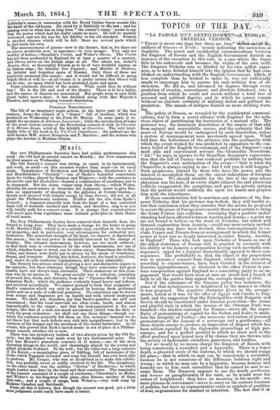311 Ufl it.
The two Philharmonic Societies have had public performances this week : the Old had its second concert on Monday ; the New commenced its third season on Wednesday.
The Old Society's concert was strong, as usual, in its instrumental, and weak, as usualŌĆöon this occasion weaker than usualŌĆöin its vocal music. Symphonies of Beethoven and Mendelssohn, Beethoven's in C and Mendelssohn's "Scottish "ŌĆöone of Spohes beautiful concertante duets for violins, played by Sainton and BlagroveŌĆöwith the overtures to Euryanthe and the ZauberfloteŌĆöformed a combination of excellence not to be surpassed. But the noisy, -vulgar song from Oberon, ŌĆöwhich Weber, allowing his good-nature to overcome his judgment, wrote to give Bra- ham an opportunity of shouting to the galleries at Covent Garden,ŌĆö though now shouted with infinite energy by Sims Reeves, did not at all please the Philharmonic audience. Neither did the trio from Spohes iessonda ; a fragment absurdly torn from the heart of a fine concerted finale full of dramatic incident and action, and therefore, sing it as you will, totally unfit for a concert-room. It is strange that concert-givers will never gain from experience some rational principles in their choice of vocal music.
The New Philharmonic Society have removed their domicile from the Strand to Long Acre. They have made a change for the better in going to St. Martin's Hall ; which is of a suitable size, excellent in its acousti- cal properties, and, in particular, very advantageous for orchestral per- formances. The numerical strength of the band, we observe, is diminished this season ŌĆó but its real power is decidedly increased by the change of locality. The stringed instruments, however, are too much reduced ; so that their tone is overbalanced by the wind instruments, not one of which, whether brass or wood, can be taken away. Sometimes the violins, violas, and basses, were fairly put to silence by the storm of trombones, drums, and trumpets. Bating this defect, however, the band is excellent, and, under its able conductor Lindpaintner, did its duty admirably.
The Society has always aimed at giving a new and distinctive aspect to its concerts; but these attempts, though they have sometimes had good results, have not always been successful. Their endeavour on this occa- sion was by no means so. The great novelty was a selection, consisting of several airs, duets, and choruses, from the " Passions-Musik " of John Sebastian Bach ; which the audience evidently found heavy and tedious, and received accordingly. We cannot pretend to form that judgment of Bach's oratorios which can only be gamed by hearing them performed entire and on a scale of sufficient grandeur. No conclusion can be drawn from scraps and fragments got up hastily and with utterly inadequate means. We shall not, therefore say that Bach's melodies are stiff and constrained ; that his vocal intervals are often crude, harsh, and almost impracticable to the singer ; and that his instrumentation is dry and meagre, like that of a man not much accustomed (which was the fact) to write for great orchestras : we shall not say these thingsŌĆöthough cer- tainly the audience generally felt them on this occasionŌĆöbecause we do not know but that such defects may sink into insignificance, lost in the vastness of his designs and the greatness of his choral harmonies. At all events, this proved that Bach's sacred music is out of place at a Philhar- monic concert, whether old or new.
There was one symphony instead of two always given by the Old So- ciety; but the balance was made even by two instrumental solos. The first was Mozart's pianoforte concerto in D minor,ŌĆöone of the most charming things in the world, and charmingly played by the young and gifted Arabella Goddard. So far well ; but the other was a long concerto of De Beriot,ŌĆöa meaningless piece of fiddling, full of imitations of the tricks which Paganini invented and none but himself has ever been able to perform. Mr. Cooper, who WM so ill-advised as to make this exhibi- tion, was probably never so coldly received in his life. The symphony, on the other hand, was the sublime "Eroica" of Beethoven ; to which ample justice was done by the band and their conductor. The remainder of the concert consisted of a couple of overtures,ŌĆöCherubinfs to Afedea, and Weber's to his forgotten little piece Abon Hassan, neither of them first-rata; and a couple of songs, both Weber's,ŌĆövery well sung by Madame Caradori and Reichardt.
From all this it follows, that though the concert was good, yet a little more judgment could easily have made it better.


































 Previous page
Previous page